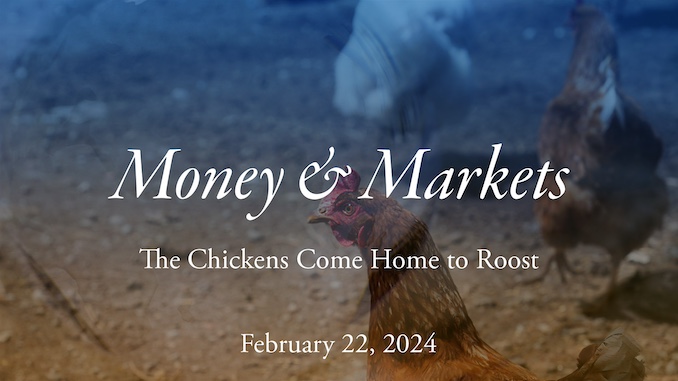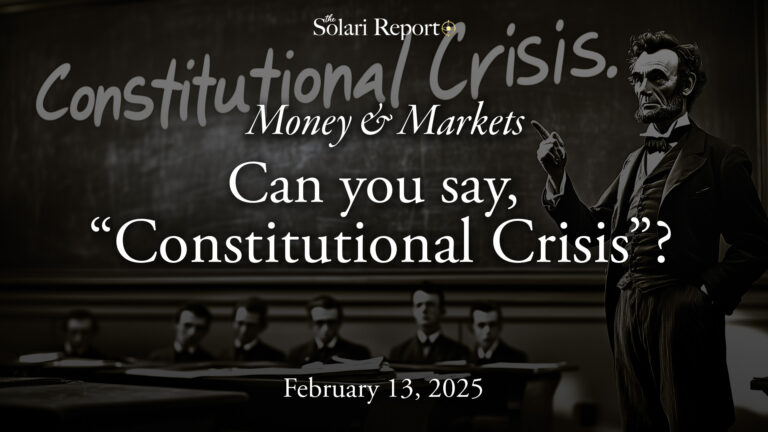By Catherine Austin Fitts
Theme
Deep State Tactics 101 – FASAB 56, Operation Gladio, the Phoenix Program and Cointelpro and the Shredding of the Treaty of Westphalia and what it all means to your digital cybersecurity (shadownet = shadow work) and crime in your neighborhood
– Warning re: US Tax Sheltered Accounts – 401ks, IRAs
Stories:
- British Elections – Brexit is On
- FT- Nato: Beijing’s growing influence poses challenges that “we need to address together as an alliance”
- House Democrats Reach Agreement with White House on USMCA
- Winter Storm: Delivers Snow to 30 States
- Exxon Found Not Guilty of Fraud in Climate-Change Accounting Case
- DC Furball
- The Afghanistan”Failure”
- Pentagon on Low-Grade Nuclear Weapons
- NY Times documents – Afghanistan was a huge success
- What would happen if your state had to run a trade surplus? US Trade Statistics
- Congress authorizes and funds the US Space Force
- Australian Fires – burned area of size of Hawaii
Interview:
2nd Quarter 2019 Wrap Up – The State of Our Currency
Take Action
Want to Have a Real Impact? Shift Your Time to State and Local Politics
Gifting to the Children We Love
Hero:
Let’s Go to the Movies:
The Spider’s Web – Britain’s Second Empire
Blast from the Past









Catherine. I’ve asked this question two different ways but so far have not gotten an answer. Are you familiar with the National Infrastructure Bank legislation that is moving through congress now? What do you think of this way of funding badly needed infrastructure repairs and new and needed innovations? It is backed by the people who support Sovereign State Banks which I know you support. Can you tell me what your thoughts are–perhaps on the next Financial Revolution. I am working to get endorsement for this bill in from my Colorado representatives but am still not sure of its fiscal stability? NIBcoalition.com Thank you for all your wonderful work. Dariel
Have it on my list to look at the legislation. Unfortunately, it is likely to be used to buy more central control and be used to build out the control grid. Any money under federal control is now organized more or less to do that. We need the feds to stop draining state and local resources and citizens so they can build infastructure that the private markets can support. Strongly recommend the interviews with Chuck Marohn on the Solari Report.
Hi Catherine,
Thank-you for all of your work.
I hope you don’t view this as a cheap solicitation for advice. This issue has consumed me for the past two years. I desire any extra intelligent-people opinions that I can get.
I have been in a dilemma for quite some time. I am a mid-30s male, with children and reside in Southern Ontario, Canada. The entire real estate market in the province has exploded over the past 10 years. Every location has observed 50-100% price increases (or more with no end in sight for the city that I reside in). Rents have increased likewise. There is no longer an affordable place to live in this province.
I am listening to your MegaCities wrap-up and you suggest not to be a renter. So what would you or your subscribers prefer with regards to these scenarios that I face?
1. (Current Living Situation) – Renting a nice house, utilities included and well under market rental price due to positive relationship with landlords. It is surrounded by big, beautiful trees and backs onto a park. The property is located in a top neighbourhood in a medium sized city and is easy walking distance to a natural food store where I can obtain high-quality food. I have substantial savings and if I am moderately smart, will never live in debt. Oh yeah, and there is immense pressure from my wife to buy a house.
2. Buy a house in the country (which I dream of) with water from a well and enough property for a large garden and future greenhouse. It would be a longer commute to my full-time job by about 20 minutes (total 30-40 minutes). I would pay a 20% downpayment and have a huge mortgage (especially compared to if I bought 4 years ago) that I would be paying into my 60s. I would retain a large portion of cash in reserve equal to about 20% of the mortgage. My wife would be happy.
Here is a crucial point. I have noticed crime rapidly increasing in my city. The police report huge increases in home break-ins. The nature of a large portion of these break-ins are homeless people who check for any open doors/windows etc. in nice neighbourhoods where the homeowners are not home. They sleep in the house and eat the food then leave. The police do nothing about it. In my driveway, if you don’t lock your car doors, your vehicle will be rummaged through with almost 100% certainty that night. My vehicles have been ransacked 4 times this year alone (I try to remember to lock them but sometimes, for whatever reason, I forget). The local police have just issued a warning that there is a major catalytic converter theft problem from parked vehicles around the city.
This is in addition to the skyrocketing homeless and drug problems. I work in the ambulance dispatch answering medical 911 calls. I observe the phenomenon first-hand and can confirm the rapid increase.
This city used to be a location that was affordable and offered respite from the overpriced Toronto Metro Area. It is now ludicrously higher compared to historical prices (inflation adjusted). There is nowhere in Ontario for residents to rent or buy affordably. The scenario is frightening. If you are looking for a hotspot for an Occidental societal breakdown, look no further than Southern Ontario, Canada. The cliff is here, the housing bubble spread to EVERYWHERE.
Shelter is a necessity, especially in Canada. Aside from living at home with parents and siblings, shelter is now out of reach for most of our young people.
I am very lucky to be in a position (for now) where I have a choice in living arrangements.
Just had a second listen. You actually stated that you think that through urbanization and getting folks as renters, it permits easier mind control. You didn’t state ‘not be a renter’.
Kelly:
Need more info. Is your wife on board for growing your own food if you move to a house in the country? Do you and your wife know how to grow food? Also, can you start with a smaller house if you do to reduce the mortgage size? Also, can you set it up to convert to wood heating if need be? On the commute, will you have to drive or can you take transit or bike? Can you use that 40 minutes for reading or listening to audios that could be highly productive?
Thank-you for taking the time to respond. It is greatly appreciated.
My wife is definitely on board for growing food. She is a farm girl, raised on a 110 acre farm where they kept cattle, free-range chickens and to a lesser extent pigs and sheep. The crop was mostly grain and hay. She knows how much of a struggle it is, both financially and laboriously, to farm.
Besides a little haying experience, I lack farm experience. However, my mother was an avid gardener and a natural greenthumb (mennonite runs in our blood). On our village property, she maintained beautiful and extensive gardens throughout my childhood/teens. There was always a small vegetable garden for us to pick from.
We have been training/preparing for a move to the country by renting a 15’x 12′ community garden plot and practicing our vegetable growing. Moderate success but many valuable lessons. We would definitely be in a position where for the first few years, we would require heavily supplementing of our grown food with market bought items. Hopefully the ratio would improve as our garden evolves.
We are not looking at large houses per se. The real cost originates from seeking a liveable house on at least a couple of acres. I am only looking at properties that have woodstoves. It is a must for me.
The commute would be driving. Currently, I cycle to work in the summer and would miss it, but I would find a way to make up for the exercise. Gardening helps…
I could most definitely find good listening material. I do love music though. Regardless, I find driving by myself outside of the city to be an excellent time for introspection. I use it.
Do you know the families and people who will be around you in the country. Also, your equivalent of the Sheriff. You need to make sure you do a serious mapping of the people and money and risk issue in the place you are looking at it. Gary Eldred who I interviewed on homebuying https://library.solari.com/successful-homebuying-with-dr-gary-w-eldred/ wrote a great book about common mistakes – he was more focused on cities and suburbs – but very good checklist.
Download Product Flyer
Description
About the Author
Permissions
Table of contents
Selected type: Paperback
Quantity:
$16.95
The 106 Common Mistakes Homebuyers Make (and How to Avoid Them), 4th Edition
You can usually find a low cost used copy on line.
https://www.wiley.com/en-us/The+106+Common+Mistakes+Homebuyers+Make+%28and+How+to+Avoid+Them%29%2C+4th+Edition-p-9780471751236
Hi Catherine,
Thank-you for the reference. I finished reading the book and listening to the interview. I feel more comfortable with my goals for the home purchase.
Couple of notes. Sort of ominous that the 4th edition of the book was published in 2006. His number one mistake is stop renting now. I am sure at least a few people took that advice and were burned over the next couple of years. If they rented a bit longer then purchased, they could have been in a much better position. But we know about hindsight.
Also, some of his borrow as much as you need for your desires and put none down if you are able (using ARM loans) I had trouble digesting. Perhaps that is my bias and the reason why I missed the huge market balloon over the past couple of years.
Otherwise a solid resource. I have already put to practice some of his information with the real estate agent.
Excellent comments. Thanks. If people do ARMS, I always recommend setting up a rapid amortization using what a higher fixed income monthly payment or more would be.
I am recording an interview with Marie McDonnell on mortgage servicing in January that will publish in Feb. I would recommend listening to that one as well.
Kelly… Catherine already mentioned this, and I hope you won’t mind me underscoring it… talk to the Sheriff/a Sheriffs Deputy, with time on the job in the area you are looking at.
Most professional burglary rings focus on outskirts rural farm/farmette properties for burglary schemes. It just goes with the territory, and has been that way for decades. Properties where folks leave and go to the city to work are the target demographic.
A locked gate, alarm system, good lights and often video cameras with signage at the fence line to deter theft will tend to make burglars look for softer targets.
Your Sheriff can tell you more about how to secure your place from theft.
Good advice. A good Sheriff’s office has a wealth of intel.
New to Solari, wisdom and knowledge come in many forms and ways. Thank you Miss Catherine and your team. Yes the farmers are in trouble, small and big but especially the big ones. Yes many dive trucks to survive, as well as do other off farm jobs. Many reasons for this just one is addiction to big ag chems, seeds, and methods. Regenerative ag and the 5 principles of Regen ag are making progress but slow. Yes many farmers are still in the field trying to harvest crops. Super wet yr, late planting, unstable markets and early cold/snow as well. If Cosmic rays go up again next yr it will be worse. Lots and lots of crop losses this yr.
Isn’t it poetic justice that the Afghanistan war, and the increase in heroin production it engendered, coincides with the opioid epidemic in America? Karma?
IMO, not karma, rather a plan.